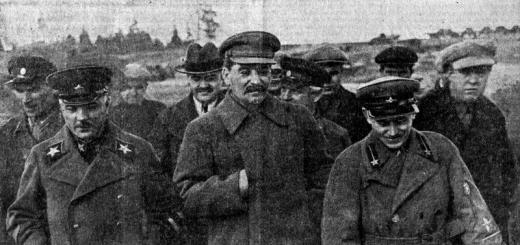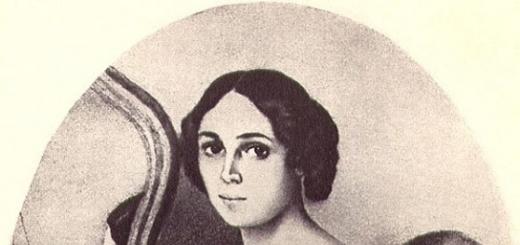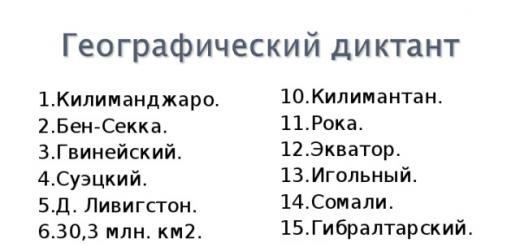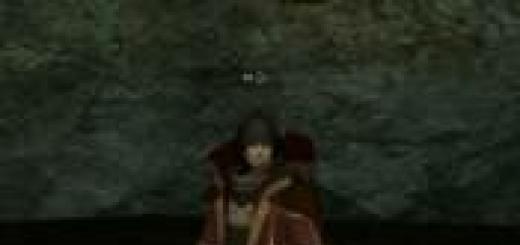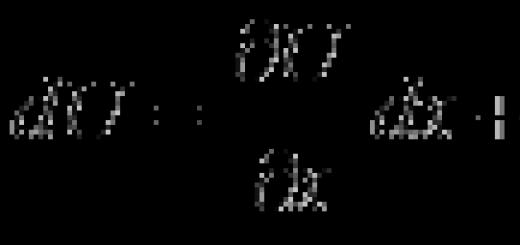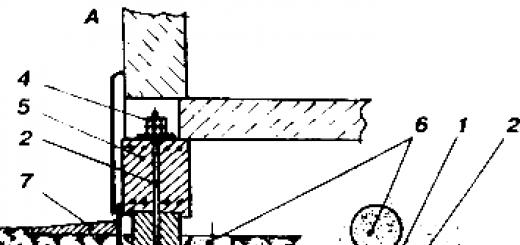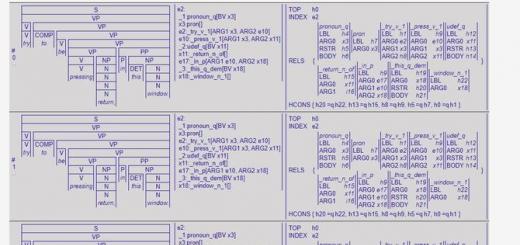A. T. Tvardovsky himself did not believe that the poems that make up the poem “By Right of Memory” are an independent work; he wrote them as a continuation of the poem “Beyond the Distance is the Distance.” During the poet's lifetime, these poems, of course, could not be published, although A. T. Tvardovsky himself prepared them for publication shortly before his death. At the end of the 60s, negative trends in the socio-political life of the country intensified, and what later received the capacious name “stagnation” set in. Even the semi-glasnost that was possible during the Khrushchev “thaw” came to naught. And therefore, Tvardovsky’s poems about Stalinism “came their turn” only in the late 80s, during the time of true glasnost.
The poem “By Right of Memory” is the final work of A. T. Tvardovsky, these are his thoughts about the life he lived - both his own and his country. He returns to past events and judges them as a man and a citizen - by right of memory. Memory does not lie, memory illuminates people and events in their true form, memory is free from the errors of the moment.
Compositionally, the poem is divided into three parts. The first part is called “Before Departure” and depicts the poet’s youth. A village boy dreams of leaving his outback, exchanging it “for the whole wide world.” Tvardovsky himself and his contemporaries dreamed of “suddenly reaching all the sciences,” they dreamed of big things, grandiose discoveries, an interesting and exciting life. There was only happiness ahead, which must necessarily reward young enthusiasm and creative impulse.
At the same time, people of the generation of the 20s and 30s had the feeling that the country was surrounded by enemies, that the young Soviet Republic was threatened from all sides by enemy forces. And therefore the younger generation was ready “for a campaign” in which they had to “give their lives” for victory.
This youthful mixture of expectation of happiness and readiness to sacrifice oneself for the sake of the Motherland constitutes the pathos of the first part of the poem. All this was “a lifetime ago,” and at the end of his days the poet remembers his former self with light sadness.
The second part has a completely different tone, which is already determined by the title - “The son is not responsible for his father.” Here, memories of Stalin's repressions come to life like an ominous ghost. Tvardovsky himself all his life bore the stigma of “not a kulak son, but a son,” and in his youth he even hid his origins. Now, at the end of his life, the poet reflects on how it could happen that an entire generation, from birth, felt guilty of something for which they could not be held accountable. The state considered “babies of enemy blood” dangerous. The title “son of an enemy of the people” crossed out the whole fate and even life of a person. Every year there were more and more such people, “and everything seemed to be missing in the country of branded sons.”
When the cup of people’s anger overflowed, the party and its helmsman made a sharp turn: articles like “Dizziness from success” or formulations like “The son is not responsible for his father” appeared. But after hundreds of thousands of people, having received the ominous nickname CHSIR - a member of the family of a traitor to the Motherland, were innocently exiled or thrown into prison, this false phrase of the leader really could not help anyone.
Injustice and cruelty were elevated to the level of state policy, in which entire peoples were subjected to repression and forced deportation. What is most striking is that, despite what was happening, many people retained naive love, even reverence for the “father of nations.” The propaganda machine worked so devilishly skillfully that people forgot age-old moral rules. Denunciation of a loved one, public renunciation of a father accused under Article 58 - all this was considered (and by many - sincerely!) civic valor. Horrible crimes were justified in the name of Stalin:
And the soul with human feelings
Don't aggravate yourself, sparing yourself.
And bear false witness in the name
And commit atrocities in the name of the leader.
Years have passed, the children of those terrible years have become fathers, and now they are responsible for the “universal father.”
The final part of the poem is called “On Memory.” On behalf of his generation, on behalf of those who became “camp dust,” the poet judges the past. He angrily accuses Stalin of inhuman cruelty and asks the question: how could it happen that the true face of the “father of nations” was unknown to people? A. T. Tvardovsky’s answer is quite in the spirit of his time. It seems to him that the whole point is “a crafty substitution”, that the names of Lenin and Stalin were “roughly doubled”, that Stalin was considered the continuer of Lenin’s work, while he never was. Stalin grossly distorted Lenin's ideas, and the task is to return to Leninist norms of party and public life.
Today, new facts and documentary evidence have changed our understanding of Lenin. Of course, he was not a bloody dictator like Stalin, but many of the atrocities of the Stalinist regime are associated with Leninist ideas, for example, the idea of strengthening class struggle during the construction of socialism. But we cannot blame A. T. Tvardovsky for his vision of history, because every person, even a great artist, is limited in his views by the time frame.
The exposure of Stalinism, even such a vivid one, filled with great artistic power, today no longer seems like a revelation. But the poem “By Right of Memory” still evokes grateful feelings from the reader, because it contains the living, truthful and hard-won word of a great artist about his era.
February 21, 2018The work “By Right of Memory” truthfully tells about a difficult time. Echoes of the past are clearly heard in it, the terrible fate that the “father of nations” prepared for his children. Tvardovsky’s poem was born as an act of protest and even with its title exploded the terrible silence that covered the crimes of the Stalinist regime.
History of creation
From the time the work was written, we will begin a holistic analysis of “By Right of Memory.” It was written in 1966-1969. The author is trying to publish his creation on the pages of the New World. But the censorship persistently does not allow the poem to be published. Criticism of Stalin in these years gave way to complete oblivion and silence. Tvardovsky never saw the poem in print. The new work was conceived as an addition to the work “Beyond the Distance - the Distance.” Later it became independent. As a detailed chapter-by-chapter analysis will show, Tvardovsky’s “By Right of Memory” is a work that reflected the author’s reaction to the political situation of the 60s.
The publications of the New World acquired a clear oppositional character. In 1968, Soviet tanks appeared on the streets of Prague, and a note appeared in Tvardovsky’s notebook: “How Prague greeted us in ’45, and how it greets us in ’68.” The writer condemned this action and did not sign the letter to the Czechoslovak writers. This is an act with a capital “C” - civil, human. But this irritated the officials, and they literally took up arms against the magazine and the editor-in-chief. A detailed analysis will show why it was unthinkable to publish this poem in those years. “By Right of Memory” is a work that was published in the magazine “Znamya” only in 1987.
Genre and compositional features
The work has three parts, preceded by a short introduction. Many literary scholars call Tvardovsky’s work a triptych. The author himself called him the same thing during his work. The magazine "Znamya", which first published this poem, defined its genre as a lyric poem. In the final version, the "triptych" designation was dropped and titles were given to parts of the poem. This emphasizes the plot and psychological component of Tvardovsky’s work “By the Right of Memory.” The chapter-by-chapter analysis we are now looking at will show that the emotional subtext of the poem is very deep. This is confession-repentance, conversion, accusation. The integrity of the poem is given by the author himself and the monologue form of the narrative. The work opens with an introduction that expresses the writer’s life credo.
First part
Let us continue the analysis of “By Right of Memory” by Tvardovsky and consider the first chapter of the work. While working on the poem, the author decided to include here an episode of leaving his home, a fragment that appeared under the title “In the Hayloft” even before the publication of the work. This poem made up the first part of “Before Departure.”

It was written as an appeal to a friend of his youth and created an atmosphere of trust when conversations were held about the most secret things. The author accurately conveys the feelings of youth - the hopes and aspirations of young heroes. Two village youths are full of hope and are getting ready to hit the road, “abandoning our outback.” They are driven by lofty thoughts - “we lived by a cherished plan”, youthful maximalism - “a spirit unknown to doubt” and a romantic dream - “we ourselves only expected happiness.”
Second part
We will continue our chapter-by-chapter analysis of the poem “By Right of Memory” with the words that Stalin “dropped in the Kremlin hall,” and they were perceived by many people as getting rid of the “indelible mark” - “a son is not responsible for his father.” The second part of the work is called the same. The words of the “father of nations” turned out to be a deception, and Tvardovsky reflects how immoral and inhuman these words “for the guilty without guilt” are.

Repeating themselves, they acquire a completely new emotional and semantic meaning in the work “By Right of Memory.” The analysis shows that in exactly five words the author writes down the fates of peasants crippled by the “great turning point,” entire nations thrown into exile, the fates of people who had to pay doubly for the miscalculations of the “great commander.”
The third part
We continue the analysis of “By Right of Memory” by Tvardovsky. The last chapter of the poem “On Memory” conveys the author’s thoughts and motives stated in its title: “they are silently ordered to forget.” It is written in a free manner. In it, the author raises many questions: echoes of the debates that took place in the editorial office of Novy Mir, when they defended the right of literature to tell the truth. “They tell me to forget and ask me to forget - a memory under seal.” All lines of the text create a holistic view and are built on the worldview of the author, who clearly expresses his position. “Everybody knows everything; trouble with the people! Tvardovsky measures everything by the highest criteria for him - “real truth”, “truthful memory” and conscience. The key words of the third part are: reality, truth, memory, pain.

As the analysis “By the Right of Memory” showed, Tvardovsky’s words tell everyone that only we are responsible for our time, and each of us is indebted to the past. No matter how bitter the truth is, and no matter how much they want to “drown it into oblivion,” everyone should know the truth in order to protect themselves from repeating terrible and criminal mistakes. Therefore, the poet measures everything by “true memory,” since without it there is no participation in life. Behind the hero of the work is a poet-citizen who teaches us high morality, mercy and citizenship. To be those people who “keep their eyes open.”
A few months before starting work on the poem “By Right of Memory,” A. T. Tvardovsky wrote: “It seems that for the first time in a long time I felt the approach of a poetic theme, something that was not said and that I, and therefore not only me, need be sure to express it. This is a living, necessary thought in my life.” The poem “By Right of Memory” is a confession; it is largely autobiographical and is the result of many years of difficult thoughts of the author. In the first chapter of the poem (“Before Departure”), the author recalls his youth with its rosy hopes, about a friend with whom they naively dreamed and believed in the future:
We were ready to go. What could be simpler: Don't lie. Don't be a coward. Be faithful to the people. Love your native mother land.
Self-confident optimists did not assume that happiness was not the only thing to be expected from life.
In this chapter there is only a foreshadowing of the harsh historical reality, the tragic conflicts of the era. These conflicts unfold in all their magnitude in the chapter “The Son Is Not Responsible for His Father.” This chapter expresses not only the personal pain of the poet, the son of an “enemy of the people.” In this chapter, the poet paradoxically turns different facets of the famous Stalinist formulation “The son is not responsible for his father.” It has always been interpreted as a kind of life preserver, which a compassionate and fair leader threw to the unfortunate outcasts, tainted by kinship with the “enemies of the people.” But the poet proudly rejects such a handout; he is not going to gain the right to prosperity at the cost of betraying his father; the completely opposite choice seems more reasonable to him:
What if that son (and not son!) Having received such rights, could I answer for my father?
And in fact, he undertakes to be responsible for his father, to answer - in the sense of protecting, interceding. And the son responds by defending his father’s human dignity.
And he does it artistically - he creates a plastically visible image of a great hard worker-peasant. Here, for example, is a description of my father’s hands:
Those hands that, by their own will, Neither straighten nor clench into a fist: There were no separate calluses, Continuous - truly a fist!
The thought of responsibility for the father organically leads to the thought of responsibility for everything that happens in the country, of common guilt. Now the poet is no longer looking for any excuses for himself and for everyone who, if they did not participate in the atrocities of the Stalinist regime, was silently present during them. The price to pay is inescapable moral torment:
And the trial lasts for decades, And there is no end in sight.
A. Tvardovsky believes that every decent person who lived through those times judges himself by this secret court of conscience.
The third chapter, “On Memory,” is the result of the poet’s thoughts about the life he lived, about the difficult era that befell him. The main idea in it is the idea of historical memory. Refusal of memory, a ban on memory is a refusal of responsibility, of repentance and atonement for guilt. The poet argues with those who find it more convenient not to remember the tragedies of the past.
They say to forget, to forget silently, They want to drown the living reality into oblivion. And so that the waves close over her. True story - forget!
The poet is ready alone, against everyone, to defend the right to memory, because if you don’t remember the past, it can repeat itself:
Who hides the past jealously. He is unlikely to be in harmony with the future.
A. Tvardovsky fell on hard times.
He lived through and suffered through the thirties and forties, the post-war years, the time of Khrushchev’s “thaw”. He revealed a huge and difficult world to the reader in his poetic works. The poem “By Right of Memory” is the poet’s confession, in which he poured out everything that “lived, seethed, ached in his soul.
Analysis of Tvardovsky’s poem “By the right of memory”
Other essays on the topic:
- Throughout its history, Russia has endured many adversities. Wars with foreign enemies, internecine strife, popular unrest are the shadows of these...
- The poems “Beyond the Distance, the Distance” and “By Right of Memory” have not yet been subjected to comparative analysis in Tvardov studies. And this is no coincidence....
- Quite recently I read a poem by A. Tvardovsky, which is called “By the right of memory.” This creation, unknown to me before, deeply shocked me...
- The theme of responsibility and memory received a special resonance in the work of A. Tvardovsky, who experienced all the hardships of the Great Patriotic War. The poet proves that...
- In 1925, Akhmatova wrote a poem dedicated to the memory of Sergei Yesenin. It was not published during her lifetime, it was published only in...
- Tvardovsky himself wrote about himself that he was “not a miracle of a special, chosen fate,” that life “deprived him of nothing, nothing in...
- The early period of the poet’s work is represented by many discoveries in the field of versification. Almost immediately abandoning attempts at literary imitation, Mayakovsky literally burst into...
- A poem called “Terkin in the Other World” is connected with the military plot. It was published only in 1963, although...
- The short poem “The Nightingale Garden” is one of Blok’s most perfect works. It is no coincidence that Blok was often called the singer of “The Nightingale’s Garden.” IN...
- There is a new guy in the infantry company, Vasily Terkin. He is fighting for the second time in his life (the first war was Finnish)....
- Tvardovsky, of course, could not have known these words when he wrote “The originality of Tvardovsky’s poem “Muravia, the ancient Muravia country”,” but it is not by chance...
- The poet ends the story about the revolution with an episode of a labor subbotnik. This, 8th, chapter is the most propaganda. The ending of the chapter is written in the style of propaganda: “Uncle,...
- Killed in battle, Terkin appears in the next world. It's clean, it looks like a subway. The commandant orders Terkin to register. Accounting table, desk...
Tvardovsky’s works reflect those tragic periods that shook his large and small homeland. He managed to survive the 30s and 40s, the time after the war. But he was also lucky enough to live to the point where he could freely talk about what he once had to endure.
History of creation
A student can begin an analysis of Tvardovsky’s “By Right of Memory” by pointing out that the poet was an honest and uncompromising person. He was confident that the “black” pages of historical events in the country should not be hushed up - they should be made public. This is the only way to rethink them. Even in his work “Beyond the Distance, the Distance,” the poet’s idea that “silence is also a lie” is developed. In December 1963, the poet completed his work on the work “Terkin in the Next World.”
What was left unsaid in this poem, Tvardovsky planned to make part of the poem “Beyond the Distance - Distance.” However, gradually the chapters took shape into one independent work - “By Right of Memory.” An analysis of Tvardovsky’s “By Right of Memory” shows that it once again rethought everything that the poet once wrote about. And reading this work, you can see the immensity of the life tragedy that the author is experiencing. And this is not just guilt in the ordinary sense. This is a historical tragedy that became a real disaster for both the poet and his generation.

What did Tvardovsky want to say?
Further analysis of Tvardovsky’s “By Right of Memory” shows that the work is constructed in the form of an excited monologue. In it, the poet addresses his contemporaries, primarily young people. And the poem is the author’s confession “about what burns the soul” - about the trampling of moral laws, the desecration of personal dignity. The poet talks about the tyranny of the 30s, which exceeded all boundaries, which cost millions of people their lives. The poet writes about the broken lives of his loved ones - parents, brothers and sisters - who at that time were exiled to the Northern Urals. Memory in Tvardovsky’s understanding is not just memories of past events. This is the inability to forget his loved ones, the pain of his soul, which can never be erased from his heart.

Alexander Tvardovsky, poem “By the right of memory”: the main motives of the work
The work “By Right of Memory” is a lyrical and philosophical reflection on how complex the paths of development of historical events can be, how the life of an individual person can turn out. The main thing in the work is the motive of searching for the truth. This can also be indicated when analyzing “By Right of Memory” by Tvardovsky. It also further deepens the motifs that were already heard in the work “Beyond the Distance - the Distance.” However, in the poem they acquire a personal connotation. Everything that Tvardovsky talks about in his work was suffered by him throughout his life. Here we are talking about how the fate of his relatives and his own turned out.
Unjustified optimism of youth
Continuing the analysis of the poem “By Right of Memory” by Tvardovsky, the student can talk about the features of the beginning of the work. In the first chapter of the work, the poet writes about the hopes of his youth, about his friend, with whom he dreamed of better days and believed in a bright future. However, optimists who were confident in the future could not at that moment imagine that one could expect more than just happiness from life. And already in the first chapter the reader feels a premonition of an imminent historical reality that should unfold in the future.

These tragic conflicts are already described in the chapter entitled “The son is not responsible for his father.” Here Tvardovsky expresses his personal pain. After all, he was the son of an enemy of the people. When preparing an analysis of the poem “By Right of Memory” by Tvardovsky, a student can add that here the author turns the famous Stalinist formulation that a son may not be responsible for his father’s actions in completely different ways. This phrase has always been interpreted as a kind of life preserver thrown by a just leader to the children of “enemies of the motherland.”
However, Tvardovsky resolutely rejects this pathetic sop. He does not need the right to a prosperous life, which must be paid at the price of betraying his own father. An analysis of Tvardovsky’s “By Right of Memory” shows that the author undertakes to answer for the actions of his parent - and not just answer, but also stand up for him. Tvardovsky does this as an artist - describing the image of a peasant, a worker. And after the thought of responsibility for one’s father comes the idea that a person must also be responsible for his homeland.
Silence equals irresponsibility
The poet points out that there can be no justification for those people who, perhaps, did not directly participate in the monstrous atrocities of the Stalinist regime, but remained silent while observing them. And the payment for such inaction can only be moral torment until the end of days. According to the poet, every person should judge himself by the secret court of conscience. In the work, Tvardovsky discusses the path traveled in a difficult era. One of the main ideas of the poem is the thought of Refusal of the need to remember is equivalent to a refusal of responsibility.

